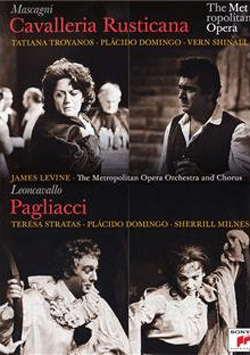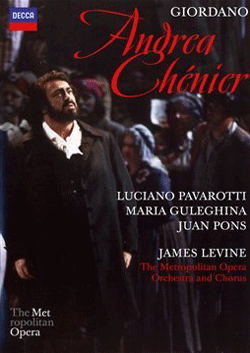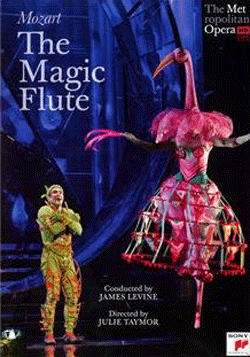Drama aplenty may occur within the Metropolitan’s offices or rehearsal rooms, but the only drama presented to the public stays within the confines of the stage action dictated by opera librettos. Appointed to the title of Music Director in 1976, Levine can look back on decades at the Metropolitan that stand as a singular achievement. That achievement will not be threatened by the sad turn that Levine’s ongoing health problems took last year, which forced him to withdraw from the rest of the current season and for all scheduled performances in the 2012-2013 season as well. For now, he retains the title of Music Director. The time is coming, however, when the Metropolitan Opera will have to transition to a new musical and artistic leader.

Whenever that may happen, Levine’s legacy will remain available for viewing, as not long into his tenure the Metropolitan began its famous “Live from Lincoln Center” telecasts, most of which are now available on DVD. And of course Peter Gelb, the current General Manager, initiated the Metropolitan Opera “HD Live” series of movie casts in 2006, with Levine conducting the premiere performance of an English adaptation of Mozart’s The Magic Flute. Viewing two of the late 1970’s telecasts (Verdi's Otello and the reliable Cav/Pag pairing), then a late 1990s’ performance of Andrea Chénier, and ending with that 2006 Magic Flute, one can see the effects of time on Levine’s physical self, but the aesthetic impression is of an ageless artistic entity, disciplined and steadfast in adherence to core musical values.
The Otello DVD alone could serve to establish the reasons for Levine’s artistic reputation. The orchestral performance powers ahead but retains tension in the quieter moments. Levine’s simultaneously manages to support the three leads, all great singers but none without flaws. The titanic Otello of Jon Vickers touches greatness, even though the tenor on that evening has occasional bouts with hoarseness. Cornell MacNeil, the Iago, finds a good match between the malevolent character and the less attractive — to avoid saying “ugly” — side of his vocal production. Renata Scotto is in fine voice as Desdemona, with only brief premonitions of the barbed-wire tightness that her top would exhibit too often thereafter. All flaws fall away in the performance’s best moments, including a devastating act four.

Considering his reputation today for tackiness and ostentation, some viewers may be surprised by the atmospheric, restrained settings director Franco Zefferelli provided. This is work that Zefferelli can be proud of - resolutely traditional but dynamic and dramatically concise. Those who followed the Metropolitan Opera in the late decades of the 20th century will be thrilled to hear Peter Allen announce the casts at the curtain calls after each act. Sony Music, which distributes these DVDs (except for the Giordano, which comes from Decca) for the Metropolitan Opera, provides no special features and only rudimentary booklets.
Zefferelli also produced the pairing of Mascagni's Cavalleria Rusticana and Leoncavallo's Pagliacci, also recorded in 1978. Almost as restrained in effect as the Otello, these operas benefit from Zefferelli’s eye for settings that can serve the larger scenes but also focus in on smaller spaces for the more intimate moments. The Cav set has the town square one would expect, but the Pagliacci somewhat strangely seems to be set in some sort of desert. The arid landscape and looming sky of the backdrop bring a sense of a dark dream to the action. As transferred to DVD, both this performance and that of the Otello suffer from murky, dark visuals.
In Italian repertory, Levine’s impeccable control may strike some as fussiness, but both these scores benefit greatly from the attention to detail and apt tempo choices. Plácido Domingo takes both leads. Despite his handsome presence, he doesn’t project Turiddu’s hyper masculinity all that well nor Canio’s borderline psychosis. Domingo reaches a higher level in the confrontation with the fierce Santuzza of Tatiana Troyanos. The rest of the Cav cast works at a lower level, especially the generic Alfio of Vern Shinall and the cheesy Lola of Isola Jones (who does, one must admit, smashingly look the part).
In the Pag, Domingo works with the affecting Nedda of Teresa Stratas, who should have fought her director when he asked her to dance and sing for most of her solo scene, affecting her breath support. Sherill Milnes looms ominously as Tonio (and of course loses his final line to the tenor). The dull Silvio of Allan Monk does drain away some of the show’s impact.

Moving ahead almost two decades for the Andrea Chénier of Giordano, Levine in 1997 may physically show the effects of the advancing years, but his leadership of the orchestra in a score than can come across as overblown and even pedestrian in places retains the positive attributes of the earlier performances. Here he has Luciano Pavarotti as his tenor lead, beefing up his sound fairly successfully and caught in relatively good shape. The TV director’s close-ups do the tenor and his heavy make-up no favors. Maria Guleghina’s Maddalena won’t please those who love the great Italian sopranos who have taken on this role; Guleghina tends to let the sheer physical force of her voice do a lot of the work, and an aria like “La momma morta” could use more delicacy. Juan Pons does his expected good work as Carlo, and the opera still manages to build up a good head of steam for its roof-rattling closing duet.
The production of Nicolas Joël shows one of the Metropolitan’s early efforts to update its production style. Joël melds some traditional tableaus with prop abstractions, especially in the suitably ominous finale.
By 2006, the Metropolitan had started not only to invite some of Europe’s top directors but also to reach out to top directors of “straight” American theater. Julie Taymor’s The Magic Flute, featuring her trademark puppetry and clever stage effects, was such a hit that the Met commissioned an English adaptation to a slightly abridged score, as a “Magic Flute for families". It still runs almost two hours, but it’s a fast, fun time, and Levine conducts Mozart with a lovely blend of taste and energy. The cast looks great, but none of them - with one possible exception - really exhibits the sheer atavistic star power that the Metropolitan Opera audiences have come to expect. Matthew Polenzani is a pleasant but anodyne Tamino, and his Pamina, Ying Huang, lacks personality. Taymor gives the Queen of the Night a spectacular costume, which helps Erika Miklósa make more of an impression that she otherwise might. Nathan Gunn clowns it up as Papageno, but his effort shows. Only René Pape commands the screen, but his accented English seems to be slightly handicapping his usual power. The English translation, by J. D. McClatchy, will be most successful for those who like cutesy puns and comic anachronisms.
Fans of Levine will want all of these; for those who may respect him but don’t necessarily count themselves as collectors, the Otello would be the indispensable selection.
Chris Mullins
![Sony 791012 [DVD]](http://www.operatoday.com/Sony_Otello.gif)


